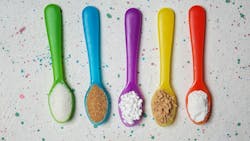Sugar alcohols, natural sweeteners, and oral health: Part 1
Listen to the article on our podcast!
Editor's note: This is part one of a two-part series. Read part two here.
With the global increase in dental caries for high-risk individuals,1 alternative sweeteners are recommended to take the place of sugar (sucrose). Although our taste buds may not be able to differentiate between sweeteners, one must consider how the body processes these sweet substitutes and whether there are any adverse oral-systemic effects.
As dental professionals, we already know the detrimental effects of sugar on oral health. Now more than ever, sucrose replacements are introduced on social media—encouraging a magnitude of sugar-free diets and recipes that are presented at almost every click on the internet—to combat weight loss and health issues regarding current nutritional trends. However, we must also be aware of the oral and systemic pros and cons of sugar substitutes and be able to translate this information for our patients while providing patient education with an emphasis on diet and nutrition. See table 1 for a breakdown of sweeteners and their oral-systemic effects.
Sugar alcohols
Sugar alcohols, also known as polyols, are additives used as bulking agents and sweeteners. In contrast to regular sugar, they provide fewer calories (about one-third fewer) when used as a sugar replacement.2 This happens because the sugar alcohols convert to glucose at a slower pace, require little or no insulin to be metabolized, and prevent a sudden increase in blood sugar. These sweeteners include mannitol, maltitol, sorbitol, xylitol, and erythritol.2
Sorbitol
Sorbitol has a lower caloric content than sucrose and only 60% of the relative sweetness. To achieve a similar perception of sweetness in a product, increased amounts of sorbitol must be added. Sorbitol, if placed in solution, can be fermented slowly by Streptococcus mutans and does not cause a fall in the pH levels in oral plaque. It is noncariogenic and has no effect on blood glucose levels.3
Xylitol
In comparison to other polyols, xylitol can be considered the most studied polyol, with reasonable evidence of an anticaries effect with topical application.4 Recent studies confirmed the effects of enamel destruction through demineralization, resulting from acid produced by sugar fermentation being depleted in the presence of xylitol—along with the suppression of subgingival plaque and bacteria such as S. mutans and Helicobacter pylori (a periodontal pathogen). Advantages of xylitol presence in the mouth are elevated levels of pH in saliva and higher production of saliva flow, which assist with the decrement of caries and periodontal microbial load.5 Xylitol does provide caloric intake and therefore can be considered nutritive. However, habitual use of xylitol can induce xylitol resistance to S mutans.
Erythritol
Erythritol’s functional roles actively contribute to the maintenance of oral and systemic health. Recent studies demonstrated erythritol has superior anticaries effects compared to other sugar alcohols, fewer laxative side effects, and potential cardiovascular benefits, especially in diabetic patients. In published studies, erythritol has been shown to be noncaloric as it is indifferent to other polyols. It is not systemically metabolized and easily absorbed in the small intestine, presenting unchanged properties when excreted in the urine.
As a result of its metabolic characteristics, gastrointestinal tolerance of erythritol is high, and, therefore, blood glucose and insulin levels are not elevated. Because of this, erythritol can act as an antioxidant by refining endothelial function in people with type 2 diabetes. Additional research concluded that erythritol can decrease microbial bacteria such as S. mutans in saliva and dental plaque, lessen dental plaque accumulation, and weaken the acidic environment presented in dental plaque, which lowers the risk for dental caries.6
Editor’s note: This is part one of a two-part series. This article appeared in the August/September print edition of RDH magazine. Dental hygienists in North America are eligible for a complimentary print subscription. Sign up here.
References
- Alsuraim BS, Han DH. Effect of globalization on global dental caries trend. Medicine (Baltimore). 2020;99(35):e21767. doi:10.1097/MD.0000000000021767
- Hofer K. Oral health benefits of sugar alcohols. Dimens Dent Hyg. 2023;21(3):16-21.
- Msomi NZ, Erukainure OL, Islam MS. Suitability of sugar alcohols as antidiabetic supplements: a review. J Food Drug Anal. 2021;29(1):1-14. doi:10.38212/2224-6614.3107
- Zhan L. Rebalancing the caries microbiome dysbiosis: targeted treatment and sugar alcohols. Adv Dent Res. 2018;29(1):110-116. doi:10.1177/0022034517736498
- Ahuja V, Macho M, Ewe D, Singh M, Saha S, Saurav K. Biological and pharmacological potential of xylitol: a molecular insight of unique metabolism. Foods. 2020;9(11):1592. doi:10.3390/foods9111592
- de Cock P. Erythritol functional roles in oral-systemic health. Adv Dent Res. 2018;29(1):104-109. doi:10.1177/0022034517736499
About the Author

Katie L. Pondolfino, BSDH, RDH, MAAL
Katie is an adjunct professor at Empire State University, where she teaches community health, leadership in health care, and health-care ethics; an adjunct professor at the University of Bridgeport in Connecticut, where she teaches dental practice management; and an instructor at SUNY Broome Community College, where she assists with all student levels in the hygiene program. She has 18 years of clinical experience and was a dental coordinator at the Greater Binghamton Health Center, a public health hospital.



